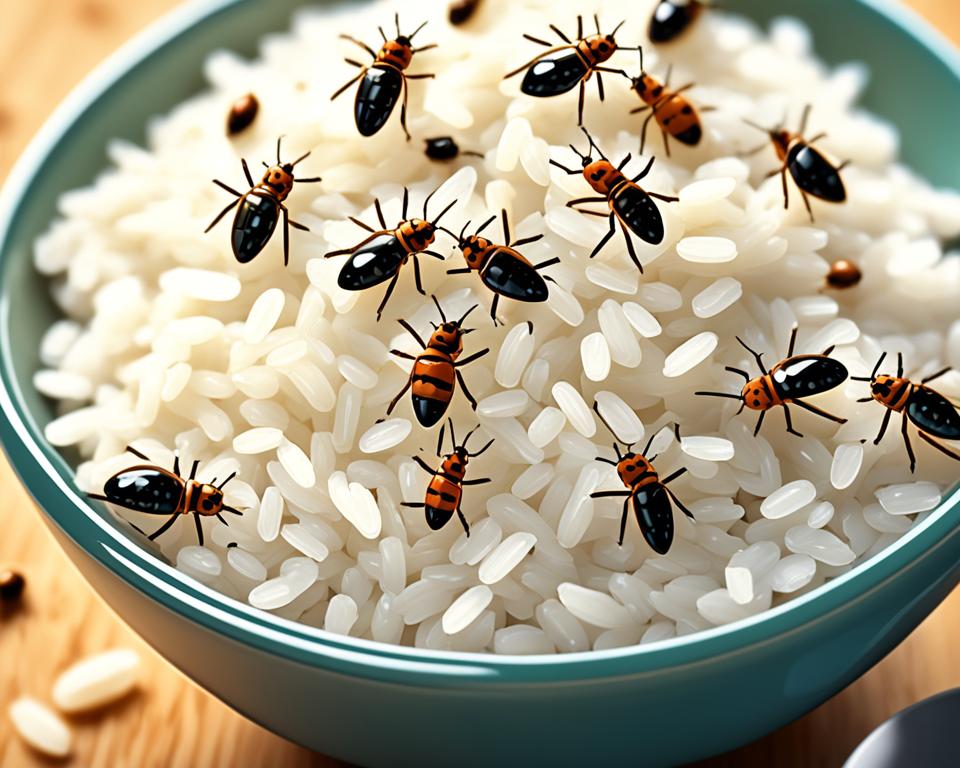Bay leaves are a versatile ingredient commonly used in cooking, but did you know they can also help keep bugs out of your pantry? Many people swear by the natural pest-repellent properties of bay leaves, using them to safeguard their rice, flour, and other dry goods from infestations. But how effective are bay leaves in preventing bugs in rice? Let’s take a closer look at this pantry tip and explore other ways to keep your pantry bug-free.
Key Takeaways:
- Bay leaves are believed to repel pantry bugs like weevils, moths, and beetles.
- Placing bay leaves in containers or taping them inside cupboards can help keep bugs away.
- Combine bay leaf usage with regular cleaning and storing foods in airtight containers.
- Other natural methods for pantry pest control include using vinegar and maintaining pantry organization.
- Inspect food items for signs of pests and discard infested products.
How Do Bay Leaves Repel Pantry Bugs?
Bay leaves are known for their bug-repelling properties and have been used for centuries to protect pantry items from insect infestations. The effectiveness of bay leaves in repelling bugs lies in a compound called eucalyptol, which is found in high concentrations within these leaves.
“The strong smell of eucalyptol in bay leaves acts as a deterrent and keeps bugs away from the food source.”
Eucalyptol is a fragrant essential oil that insects like weevils, cockroaches, and mosquitos dislike. While there may be limited specific research on the repellent effect of bay leaves on weevils, studies have shown that bay leaves can effectively deter other insects.
The bug-repelling properties of bay leaves make them an excellent natural alternative to chemical pesticides, especially when it comes to pantry bugs. You can simply scatter fresh bay leaves around pantry shelves or tape them to cabinets to keep pests at bay. Adding bay leaves to food packaging can also help deter weevils and other insects from contaminating your pantry items.
“The strong smell of eucalyptol in bay leaves acts as a deterrent and keeps bugs away from the food source.”
Here is a brief summary of how bay leaves repel pantry bugs:
- Eucalyptol, a compound found in bay leaves, repels bugs.
- The strong smell of eucalyptol acts as a deterrent for pantry insects.
- Bay leaves can effectively deter weevils, cockroaches, and mosquitos.
- Scattering bay leaves or taping them to cabinets can help repel bugs.
- Adding bay leaves to food packaging can protect pantry items from insect infestations.
Effectiveness of Bay Leaves in Repelling Pantry Bugs
| Pantry Bug | Effectiveness of Bay Leaves |
|---|---|
| Weevils | Little specific research, but general insect-repelling properties |
| Cockroaches | Effective deterrent |
| Mosquitos | Effective deterrent |
Other Natural Methods for Pantry Pest Control
In addition to bay leaves, there are other natural methods for pantry pest control. One effective option is using vinegar, a commonly used household ingredient that can help deter pests from invading your pantry.
Mixing equal parts water and vinegar in a spray bottle and applying it to pantry shelves, cabinets, and kitchen counters can help keep bugs at bay. The strong smell of vinegar acts as a natural repellent, making it less likely for pests to approach these areas.
To effectively control pests, it is important to combine vinegar usage with regular cleaning. Wiping down surfaces with warm soapy water helps eliminate existing pests and prevent infestations. Follow up with a vinegar spray to maintain a pest-free environment.
Inspecting food items for signs of pests is crucial in preventing infestations from spreading. If you come across any infested products, it is recommended to discard them immediately to prevent further contamination.
“Vinegar is a natural, cost-effective way to keep pantry pests at bay. Its strong smell acts as a deterrent and helps maintain a bug-free environment.” -[name]
If you prefer not to use vinegar, there are other natural pest repellents you can try. Some options include:
- Peppermint oil: The strong scent of peppermint is disliked by many pests, making it an effective natural repellent. Place a few drops of peppermint oil on cotton balls and strategically position them around your pantry to deter insects.
- Cedarwood: Cedarwood has insect-repelling properties and can be used in the form of cedar chips or sachets. Placing these in your pantry can help keep pests away.
- Citrus peels: The strong citrus scent from lemon or orange peels can act as a natural deterrent for pests. Simply place peels in your pantry to help repel insects.
Benefits of Natural Pest Repellents
Using natural pest repellents in your pantry offers several benefits. Firstly, they are safe to use around food items and do not pose any health risks. Unlike synthetic pesticides, natural repellents do not leave harmful residues on surfaces or food, making them a healthier choice for your family.
Additionally, natural pest repellents are environmentally friendly. They do not contribute to pollution or harm beneficial insects, ensuring a more sustainable approach to pest control.
By incorporating natural methods into your pantry pest control routine, you can create a safer and healthier environment for storing your food.
| Natural Pest Repellents | Method of Use |
|---|---|
| Vinegar | Mix equal parts water and vinegar in a spray bottle. Apply to pantry shelves, cabinets, and kitchen counters. |
| Peppermint oil | Place a few drops of peppermint oil on cotton balls and position them strategically in your pantry. |
| Cedarwood | Use cedar chips or sachets and place them in your pantry. |
| Citrus peels | Simply place lemon or orange peels in your pantry. |
Preventing Weevil Infestation in Your Pantry
To ensure that your pantry remains free from weevil infestations, it’s crucial to implement preventive measures. By following these storage tips, you can effectively weevil-proof your pantry and protect your pantry items.
Check for Contamination
Before adding any food sources to your pantry or storage containers, thoroughly inspect them for signs of contamination. Look for any holes, webs, or larvae that might indicate the presence of weevils or other pests.
Avoid Bulk Food Sections
If possible, avoid purchasing pantry items from bulk food sections. These areas are more prone to infestations due to the high turnover of goods. Instead, opt for sealed packages or individually wrapped items to minimize the risk of bringing weevils into your pantry.
Opt for Airtight Containers
Using airtight containers with tight-fitting lids is a key strategy for keeping weevils at bay. Weevils can easily chew through plastic bags and cardboard packaging, so it’s essential to transfer your dry goods to sturdy containers that provide an impenetrable barrier.
Keep Your Pantry Clean and Organized
Maintaining a clean and organized pantry is crucial in preventing weevil infestations. Regularly clean the shelves, removing any spills or food particles that might attract pests. Additionally, make sure to rotate your pantry items, using the first-in, first-out method to ensure that older products are consumed first.
Getting Rid of Weevils Naturally
If you have a weevil infestation in your pantry, there are natural methods to get rid of them. Using bay leaves as a repellent is a simple and inexpensive solution. Scatter fresh bay leaves around your countertops or pantry shelves, tape them to cabinets, or add them to food packaging to deter weevils. Another natural method is to use vinegar as a cleaning and spray solution to keep pests away. In severe infestations, it may be necessary to discard affected food items and thoroughly clean the pantry. Extreme temperatures, such as freezing or heating, can also be used to eliminate weevils.
Natural Methods for Getting Rid of Weevils
| Methods | Steps |
|---|---|
| Using Bay Leaves | – Scatter fresh bay leaves on countertops, pantry shelves, or tape them to cabinets. – Add bay leaves to food packaging. – Replace bay leaves every few weeks. |
| Using Vinegar | – Mix equal parts water and vinegar in a spray bottle. – Spray vinegar solution on pantry shelves, cabinets, and countertops. – Use vinegar solution for regular cleaning. |
| Discarding Infested Food | – Identify and remove infested food items from the pantry. – Discard affected food in sealed bags outside the house. – Thoroughly clean pantry shelves and containers. |
| Extreme Temperatures | – Freeze infested food items for at least 72 hours. – Heat infested food items at a temperature of 140°F (60°C) for at least 30 minutes. – Store food in airtight containers to prevent reinfestation. |
Conclusion
In summary, bay leaves can be an effective natural solution for repelling pantry bugs, including weevils. Although there is limited scientific research specifically focusing on bay leaves’ repellent properties against weevils, their high concentration of eucalyptol makes them a viable deterrent for various insects. Alongside bay leaves, incorporating other natural methods like vinegar and maintaining proper pantry organization can contribute to preventing and controlling weevil infestations.
To maintain a bug-free pantry, it is crucial to prioritize regular cleaning and hygiene practices. Storing food in airtight containers helps prevent pests from accessing your pantry items. Additionally, regularly inspecting pantry items for signs of infestation and promptly discarding any affected products can prevent the spread of pests.
In conclusion, by incorporating bay leaves and other natural pest control methods into your pantry management routine, you can effectively protect your pantry from weevil and other pest infestations. Implementing these measures, along with proper sanitation and organization, will ensure a clean and bug-free pantry for your culinary endeavors.
FAQ
Do bay leaves keep bugs out of rice?
While there is limited scientific research on this topic, many people have reported success with using bay leaves to repel pantry insects, including bugs that infest rice. Placing bay leaves in containers of rice and other dry goods is believed to keep bugs away.
How do bay leaves repel pantry bugs?
Bay leaves contain a compound called eucalyptol, which has insect-repelling properties. The strong smell of eucalyptol acts as a deterrent and keeps bugs like weevils, cockroaches, and moths away from the food source.
What are other natural methods for pantry pest control?
In addition to bay leaves, vinegar is a commonly used household ingredient that can help deter pests. Mixing equal parts water and vinegar in a spray bottle and applying it to pantry shelves and cabinets can help keep bugs away. Regular cleaning with warm soapy water followed by a vinegar spray can eliminate existing pests and prevent infestations.
How can I prevent weevil infestation in my pantry?
To prevent weevil infestations, it is important to check all food sources for contamination before adding them to your pantry or storage containers. Avoid purchasing items from bulk food sections if possible, as they may be more prone to infestation. Use airtight containers with tight-fitting lids to store dry goods, as weevils can chew through plastic bags and cardboard. Keeping your pantry clean and organized, and regularly inspecting and rotating pantry items, can also help prevent weevil infestations.
How can I get rid of weevils naturally?
If you have a weevil infestation in your pantry, natural methods can help. Using bay leaves as a repellent is a simple and inexpensive solution. Scatter fresh bay leaves around your countertops or pantry shelves, tape them to cabinets, or add them to food packaging to deter weevils. Another natural method is to use vinegar as a cleaning and spray solution to keep pests away. In severe infestations, it may be necessary to discard affected food items and thoroughly clean the pantry.
Are there any pantry storage hacks to keep bugs away?
Storing dry goods in airtight containers with tight-fitting lids is an effective way to keep bugs away. This prevents insects from accessing the food source and helps maintain pantry cleanliness. Regularly inspecting and rotating pantry items can also help prevent infestations.


